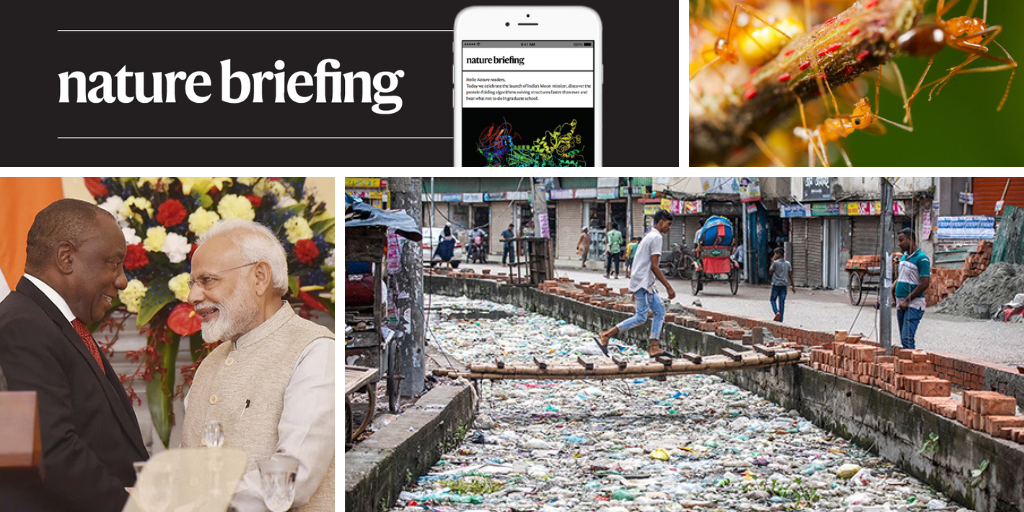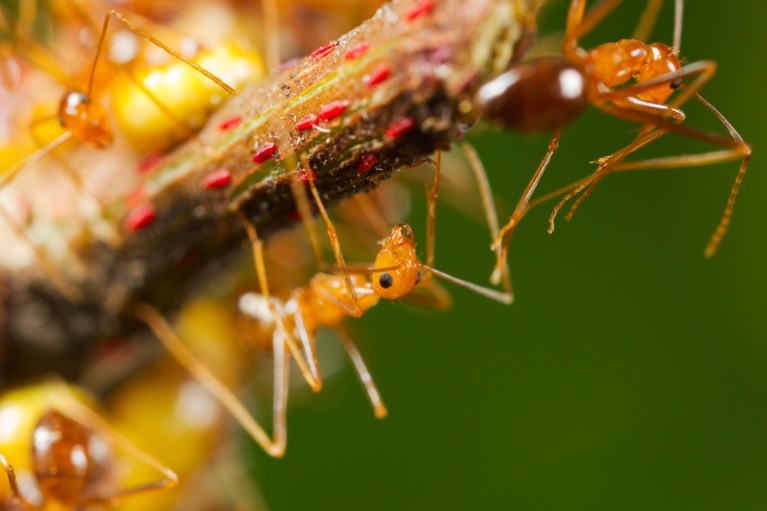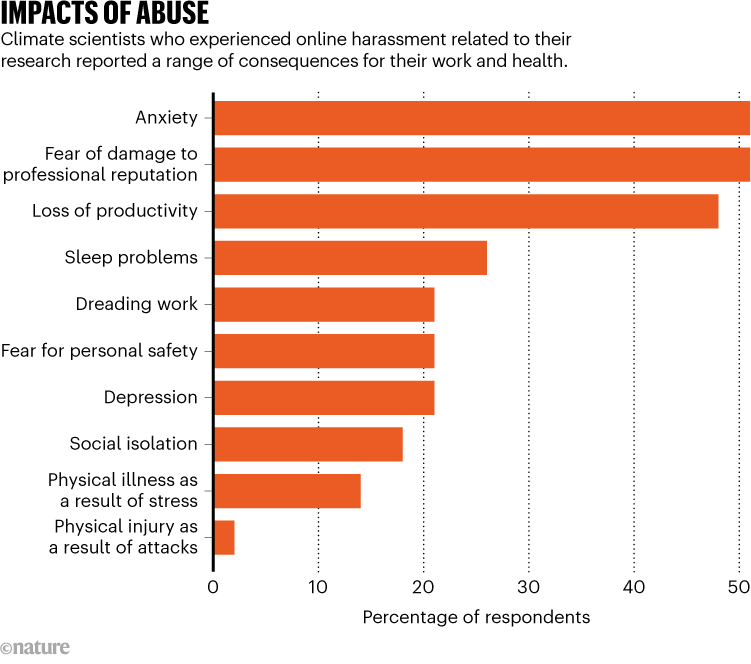Hello Nature readers, would you like to get this Briefing in your inbox free every day? Sign up here
Credit: Stephen Belcher/Nature Picture Library
Male yellow crazy ants (Anoplolepis gracilipes) are all chimaeras: they are composed of two warring cell lineages with two entirely different sets of genomes. Usually, an organism’s cells all carry the same genes. In yellow crazy ants, some cells carry only maternal and others only paternal genetic material. “It’s a piece of biology that’s unparalleled as far as we know,” says biologist Daniel Kronauer. Chimerism can happen by accident in other animals, but the ants are the first known animal for which this property is an essential aspect of life — although it’s not clear why.
More than 500 people, including many pharmaceutical-company executives, have signed a letter condemning a federal judge’s decision to overturn US Food and Drug Administration (FDA) approval of the abortion drug mifepristone. The document supports the FDA’s authority to regulate medicines and calls for the reversal of the ruling. By ignoring “decades of scientific evidence”, the decision creates a dangerous precedent that puts the approval of all drugs at risk, the letter says.
Scientists warn that wheat blast, a fungal pathogen first detected in Brazil, is spreading — and it could go global. Researchers analysed the genomes of Magnaporthe oryzae samples from outbreaks in Zambia and Bangladesh and found they had originated from distinct branches of a lineage in South America. This suggests that wheat blast reached Africa and Asia independently, hinting that human activity is probably spreading the disease. Wheat blast “threatens wheat cultivation in some of the poorest parts of the world”, says plant pathologist and study co-author Nick Talbot.
Reference: PLoS Biology paper
Prominent researchers are backing the inclusion of the African Union in the G20 group of countries. Currently, South Africa is the only African country included. “The G20 is the top multilateral forum for international economic cooperation,” says Michael Makanga, executive director of the European and Developing Countries Clinical Trials Partnership in South Africa. “For ethical and moral reasons it is critical that Africa is represented at the table.”
Reference: Advocating for a G21 ethics-policy document
Infographic of the week
Source: Global Witness
Roughly 40% of climate researchers have experienced online harassment or abuse related to their research, according to a survey by international non-governmental organization Global Witness. One-third of the female climate scientists who experienced abuse said they had received attacks specifically relating to their gender. Online attacks could discourage researchers from pursuing climate research or sharing their findings, says Henry Peck, who works for Global Witness. (Nature | 4 min read)
Features & opinion
More-sophisticated policies, smarter recycling and new materials could stem the tide of plastic waste, which is set to triple to more than one billion tonnes annually by 2060. Although there are already many well-meaning efforts to cut down on plastic, their effectiveness is unclear because there’s “virtually zero monitoring”, says policy researcher Steve Fletcher. Smart interventions could decrease the amount of uncollected and unregulated plastic litter by around 80%.
Research-ethics requirements are laudable, but they can clash with the methodologies of Indigenous researchers working within the values and protocols of their own communities, writes Nlaka’pamux food-systems scholar Jennifer Grenz. She describes how an Elder she was interviewing was happy to sign an ethics form presented by a non-Indigenous colleague, but recoiled when Grenz proffered her form — because their mutual trust and accountability ran much deeper. Explaining such complexities can be exhausting and even drive Indigenous scientists out of academia. “Recruiting Indigenous researchers is not where the hard work of reconciliation ends for universities,” says Grenz. “It is only the beginning.”
Workplace music “can motivate you, it can relax you, it can centre you”, says neuroscientist Daniel Levitin, who studies how music affects cognition and perception. In one study, people who listened to music to regulate their mood — to ease the frustration of routine tasks, for example — reported higher job satisfaction. But beware, it can also distract from complex tasks. “Save music for when it matters,” suggests organizational psychologist Manuel Gonzalez.
Listen to some of Nature editors’ own favourite working tracks on this Spotify playlist.
Today I’m pondering whether I could spend a year living in this 3D-printed Mars habitat at the Johnson Space Center in Texas. The 160-square-metre mission simulator comes with a realistic 22-minute communication delay and a tented ‘outside’ area kitted out in red sand.
Let me know what you’d pack for a holiday organized by people who say they’re “very interested in the stress response to… long-term isolation and confinement” — plus any feedback on this newsletter — at [email protected].
Thanks for reading,
Flora Graham, senior editor, Nature Briefing
With contributions by Katrina Krämer and Gemma Conroy.
We’ve recently launched two new e-mails you might like. They’re free, and of course you can unsubscribe at any time.
• Nature Briefing: Cancer — a new weekly newsletter written with cancer researchers in mind. Sign up here to receive the next one.
• Nature Briefing: Translational Research covers biotechnology, drug discovery and pharma. Sign up here to get it free in your inbox each week.









More News
Author Correction: Stepwise activation of a metabotropic glutamate receptor – Nature
Changing rainforest to plantations shifts tropical food webs
Streamlined skull helps foxes take a nosedive